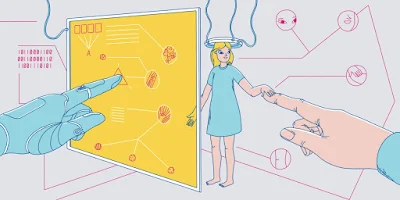GregorTobeitz, Editor The Healthcare Nerd & The Digital Strategist
Artificial intelligence is on the lips of computer scientists. Many computer scientists promise great things for it's use in health care and medicine. It will add to the growing number of digital systems to aid in care of patients.
Nearly on a monthly basis, research that documents how algorithms are over-performing on humans, have been published.
With the current pace of advancements in AI one can easily assume that in 10 years from now algorithms will over-perform humans on 80% of today’s classified diagnosis.
10 years is a long time, when you consider that during this period we will have access to new neurosynaptic processing power such as IBM’s TrueNorth or cloud based quantum computing. Ten years ago the iPhone got introduced which led to the development of 180.000 registered health apps, which equals 50 apps a day. Yes, a large part of them aren’t useful, but we can’t ignore the impact apps had on patients and clinicians. During the last 5 years we have seen error rates on speech and image recognition drop by over 20 percent to nearly human accuracy. So it is not a long shot to predict that, soon algorithms will over-perform humans on specific tasks such as diagnosing disease or selecting the best personalized treatment plan. We can’t ignore technology that, depending where you live, can deliver 10 to 100 times better results. We should discuss on how we will design our future healthcare systems and future work, and not question if this is going to happen, as at one point it might be too late to influence our future.
Harvard Medical School, showed that AI isn’t about Humans versus Machines. They trained a Deep Learning Algorithm for identifying Metastatic Breast Cancer, interpreting pathology images. Their algorithm reached an Algorithm Accuracy 92.5%, where Pathologists reached an Accuracy of 97%. But used in combination, the detection rate approached 100 percent (approximately 99.5 percent).
It is exactly this kind of collaboration between humans and machines that is going to play a vital role in the age of AI and we already have a blueprint of how a productive partnership could look like.
Chess was one of the first areas that was taken over and subsequently dominated by machines almost 20 years ago. After Garry Kasparov, the reigning world champion at the time, lost to the IBM Computer ‘Deep Blue’ in 1997, the head to head contest between humans and machines lost much of it’s appeal. Today no human, not even the grandest of all grand masters, can beat even a mid-tier chess program running on an iPhone. After this huge symbolic victory for the machines there was doubt that humans could contribute something meaningful to the world of chess ever again.
What helped the team win didn’t have anything to do with being the best chess players or having the most powerful chess computer but having the best process of collaborating with machines. It was all about the partnership and the complementary interplay between humans and machines. Humans still have a lot to offer to the game of chess if they are not racing against the machines but with the machines. To achieve the best results humans and machines have to collaborate — they have to become partners. But this requires a new set of skills and a new way of thinking on the part of humans.
Bart de Witte is keynote speaker, innovator, intrapreneur and healthcare nerd. Bart is involved in leading edge technologies leading the Digital Health Business for IBM DACH, he has been intimate involved as a mentor in the formation and growth of a dozen startups within the healthcare sector. He is passionate about technology and data-driven transformation of healthcare systems.
We also know that in our current healthcare systems we are lacking the human element. Recent studies have shown that our social determinants count for more as 50% to our health status. From a 7 minute consultation a a physician spent less then 20% for true human interaction, and is focussed on collecting clinical data, reasoning, documenting, administrating and coordinating. But one of the most important parts of care delivery, empathy and compassion have become neglected. This already starts at medical school.
A recent study done at Beth Israel Deaconess Medical Center (BIDMC) and Harvard Medical School, showed that AI isn’t about Humans versus Machines. They trained a Deep Learning Algorithm for identifying Metastatic Breast Cancer, interpreting pathology images. Their algorithm reached an Algorithm Accuracy 92.5%, where Pathologists reached an Accuracy of 97%. But used in combination, the detection rate approached 100 percent (approximately 99.5 percent).
It is exactly this kind of collaboration between humans and machines that is going to play a vital role in the age of AI and we already have a blueprint of how a productive partnership could look like.
Chess was one of the first areas that was taken over and subsequently dominated by machines almost 20 years ago. After Garry Kasparov, the reigning world champion at the time, lost to the IBM Computer ‘Deep Blue’ in 1997, the head to head contest between humans and machines lost much of it’s appeal. Today no human, not even the grandest of all grand masters, can beat even a mid-tier chess program running on an iPhone. After this huge symbolic victory for the machines there was doubt that humans could contribute something meaningful to the world of chess ever again.
We now know that is not the case.
A new Partnership between Humans and Machines in Healthcare





No comments:
Post a Comment